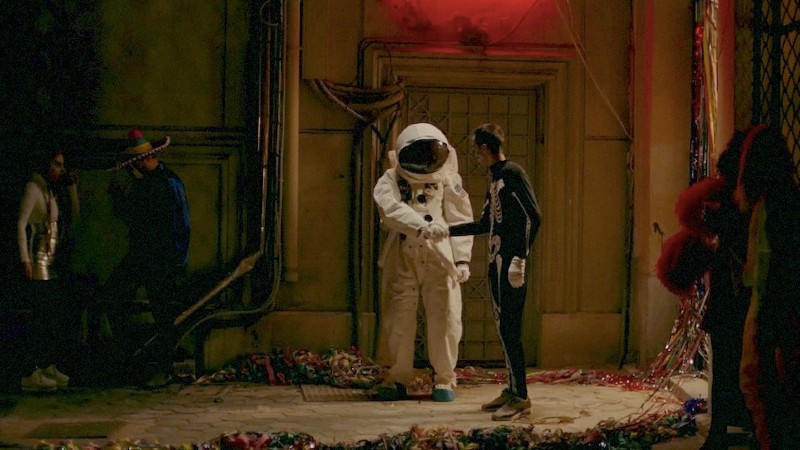




People suddenly and inexplicably lose their memory as they carry on with their daily routines. A man steps out of his car having no idea how he got there. Our protagonist the Man (Aris Servetalis) is found on a bus not knowing where he’s going, what the date it is or even what his name is. An ambulance is promptly called. The people who remain unidentified are sent to the “New Identity Programme”, where they are trained and encouraged to establish a brand new life.
These people look quiet and stern. They are not panicking. There is a profound sadness and emptiness in their eyes, as if they were robbed of their humanity, their helplessness entirely palpable. There are no wounds, no physical symptoms of the strange malaise that has suddenly struck. The film publicists have called it a “pandemic”, however there is no indication that such is the case in Apples. The film took six years to complete, and was conceived long before Covid-19 existed. This is a magnificent meditative drama about reconnecting with our primordial urges and necessities, and it remains moving and relevant with or without the coronavirus. The current pandemic, however, raises a question that the director could not anticipate: what if Covid-19 – instead of our taste and smell – wiped our memories?
This is no post-apocalyptic affair. It has little connection with Fernando Meirelles’s Blindness (2008), which focuses on a bunch of people desperately attempting to survive as the world is suddenly afflicted by a disease that claims its victims’ sight. The world is not collapsing and there is no fighting in Apples. Instead, the film focuses on one single victim and his quiet struggle to reconnect with a mostly functional society. He is unperturbed by whether his family is seeking to find him, avoiding him or whether he even has a family at all. Would your relatives and friends seek you if you lost your memory and started a new life?

The titular apples are featured throughout the movie, representing the desire to live and to sin that has seemingly vanished. The Man asks another amnesiac patient whether he likes apples, to which he replies “I don’t remember if I like them”. Our predilections are acquired, the pursuing narrative reveals. Even our libido. The Man listens to a tape with instructions from the Programme: “have fun in general” and “go to a bar, drink a lot, dance a lot” and “have a one-night-stand”. He follows the commands yet he seems to extract no pleasure from the “fun” tasks. He seems to suffer from anhedonia.
This stoic and laconic piece of reflective cinema investigates the repercussions of social and mental vulnerability. It reveals that we are but a mere concoction of those who control us (be that our family of the government Programme). Our individuality is defined by the social constructions around us: our house, our job, our friends, our lovers. Apples also shows that pleasure cannot be built upon organisation and discipline, an affront to its spontaneous essence.
There is however one type of pleasure that’s indelible: art. The Man remembers the lyrics of a Greek version of the classic tune Sealed with a Kiss. That’s the only moment in the film in which he spontaneously bursts out with joy, as he sings along. Another patient clearly remembers the storyline of Titanic (James Cameron, 1997), even though she cannot recall the film title. It made me think of the reaction of the Alzheimer’s ballerina upon hearing The Swan Lake. The power of art is such that not even the most devastating diseases cannot kill it. Art is synonymous with survival.
IApples takes place in a recent past, likely the early 1970s. The television sets are black and white, the cars are vintage. The local disco plays Chubby Checker’s Let’s Twist Again. Most crucially: there are no smart phones. These small devices have become a reliable repository for our images, sounds and emotions. Such technology would make the identification and recovery of unclaimed patients much easier. You could easily recreate your memories by simply going through the various apps on your telephone. Perhaps worryingly, our history is so thoroughly registered and stored in our phones/cloud that it becomes impossible to dissociate ourselves from our current existence.
This is a movie that will stay with you for a long time. It will persistently raise existential questions as you carry out your banal daily tasks and seek to find pleasure in your contrived existence.
Apples is out on Curzon Home Cinema on Friday, May 7th.
















